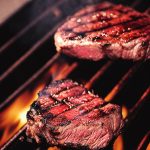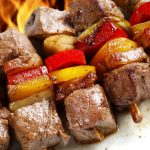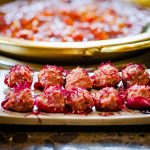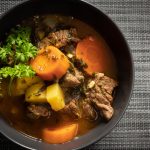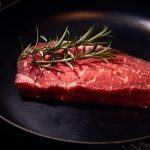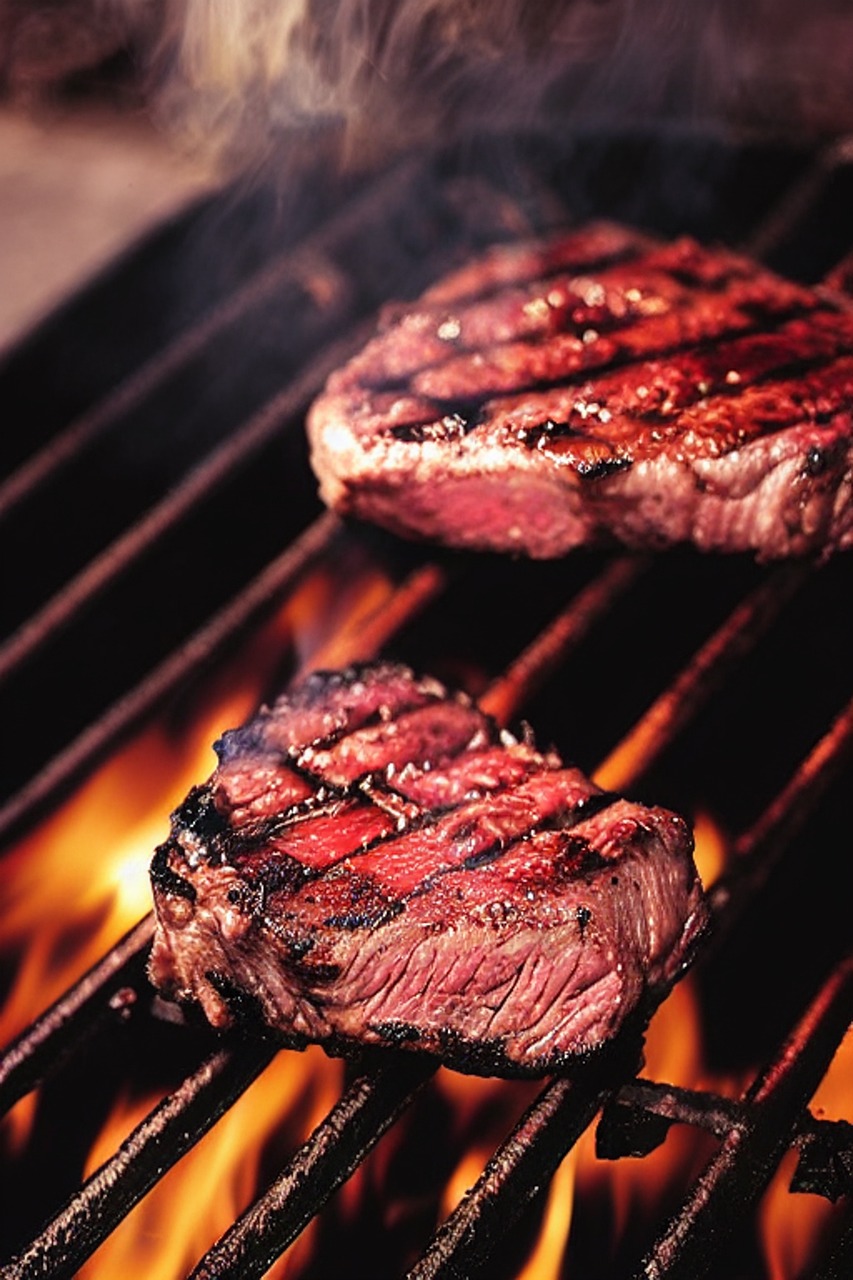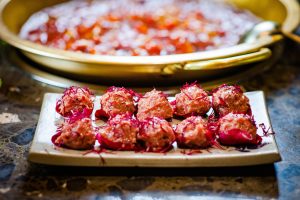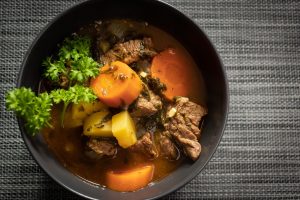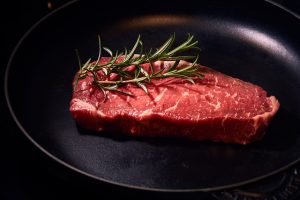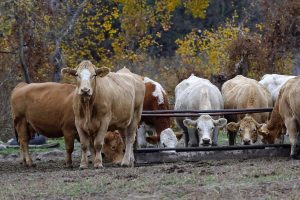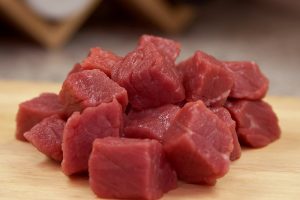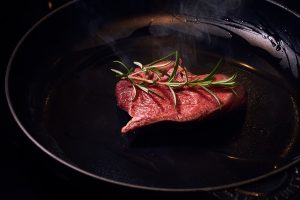“Unveiling the Rich History: The Cultural Significance of Moo Shu Beef in Chinese Festivals”
Unveiling the Rich History: The Cultural Significance of Moo Shu Beef in Chinese Festivals
In the vibrant tapestry of Chinese culture, festivals hold a special place. These joyous occasions bring people together, celebrating traditions and customs that have been passed down through generations. Among the myriad of delectable dishes that grace the festival tables, one dish stands out for its cultural significance and mouthwatering flavors – Moo Shu Beef. With its roots deeply entwined in history, this culinary delight not only tantalizes the taste buds but also inspires a sense of cultural pride.
Moo Shu Beef, a traditional Chinese dish, has its origins dating back to ancient times. It is believed to have originated in northern China during the Han Dynasty, making it a dish with a history spanning over two millennia. This alone speaks volumes about its cultural significance, as it has stood the test of time and continues to be cherished by Chinese communities around the world.
One of the most intriguing aspects of Moo Shu Beef is its versatility. It is not only a beloved dish during festivals but also holds a special place in Chinese weddings and other important celebrations. Its presence on the festival table symbolizes abundance, prosperity, and happiness. The succulent slices of beef, paired with an array of colorful vegetables, create an enticing visual display that mirrors the festive atmosphere. Moreover, the dish’s name itself, “Moo Shu,” carries symbolism, with “Moo” meaning “wood” and “Shu” representing “satisfying.” This symbolism signifies the harmony between nature and man, reminding us of the importance of balance and gratitude.
Beyond its symbolic significance, Moo Shu Beef also showcases the rich culinary heritage of China. The preparation of this dish requires skillful techniques, demonstrating the artistry and precision that Chinese cuisine is known for. The thin slices of tender beef are stir-fried to perfection, retaining their juiciness and flavors. The addition of various vegetables, such as cabbage, mushrooms, and bamboo shoots, adds depth and complexity to the dish, creating a harmonious blend of textures and tastes. The final touch, wrapping the flavorful mixture in delicate pancakes, adds a touch of elegance and showcases the attention to detail that is characteristic of Chinese cuisine.
The cultural significance of Moo Shu Beef extends beyond the confines of Chinese festivals. Its popularity has transcended borders and it has become a beloved dish in many parts of the world. Chinese communities have shared this culinary gem, introducing it to different cultures and embracing the diversity of flavors and traditions that arise from these interactions.
In conclusion, Moo Shu Beef is not just a dish; it is an embodiment of Chinese cultural heritage. Its presence on festival tables evokes a sense of joy, abundance, and tradition. The artful preparation and delightful flavors inspire a deep appreciation for the culinary craftsmanship that has been passed down through generations. As we savor each bite of Moo Shu Beef, let us celebrate the rich history it carries and the unity it fosters among cultures worldwide.
“From Festive Traditions to Culinary Delights: Exploring Moo Shu Beef in Chinese Celebrations”
From Festive Traditions to Culinary Delights: Exploring Moo Shu Beef in Chinese Celebrations
Chinese celebrations are a vibrant tapestry of ancient customs and joyful festivities. These events bring people together to honor traditions, strengthen family bonds, and indulge in delectable culinary creations. Among the many mouthwatering dishes served during these celebrations, Moo Shu Beef stands out as a delicious and symbolic treat. In this article, we will delve into the historical significance of Moo Shu Beef and its role in inspiring a sense of unity and joy during Chinese celebrations.
Analytically examining the origins of Moo Shu Beef, we find that it has deep roots in Chinese culinary history. The dish traces its origins back to the northern regions of China, where it was first created during the Tang Dynasty. Originally known as “Moo Shu Rou,” it consisted of thinly sliced pork stir-fried with vegetables and wrapped in delicate pancakes. Over time, beef became a popular alternative to pork, giving birth to the beloved Moo Shu Beef we know today.
The preparation of Moo Shu Beef is an art form in itself, involving a meticulous combination of ingredients and techniques. The dish typically consists of tender strips of beef marinated in a flavorful sauce, stir-fried with an array of colorful vegetables such as cabbage, carrots, and mushrooms. The medley of textures and flavors is enhanced by the addition of fragrant spices like ginger and garlic. The star of the show, however, is the thin, light pancakes used to encase the beef and vegetable mixture. These pancakes are skillfully crafted to provide the perfect balance between softness and crispness, creating a delightful contrast with the savory filling.
Beyond its culinary appeal, Moo Shu Beef carries deep symbolic meaning in Chinese celebrations. The dish is often served during Lunar New Year festivities, weddings, and family gatherings, symbolizing unity and prosperity. The name “Moo Shu” itself is derived from the Chinese characters for “wood” and “book,” representing the idea of a flourishing family tree and a harmonious household. By sharing Moo Shu Beef with loved ones, families express their wishes for abundance, happiness, and togetherness in the coming year.
The inspirational aspect of Moo Shu Beef lies in its ability to bring people together. During Chinese celebrations, the communal act of preparing and enjoying this dish becomes a shared experience that fosters connection and joy. Families come together in the kitchen, each member contributing their skills and love to create a meal that is not only delicious but also steeped in tradition. As the aroma of sizzling beef and vegetables fills the air, laughter and conversation flow freely, creating lasting memories and strengthening familial bonds.
In conclusion, Moo Shu Beef occupies a special place in Chinese celebrations, embodying both culinary delights and festive traditions. Its historical significance, meticulous preparation, and symbolic meaning make it an integral part of joyful gatherings. As we explore the origins and cultural significance of this beloved dish, we are reminded of the power of food to inspire unity, happiness, and a sense of belonging. So, the next time you savor a mouthful of Moo Shu Beef during a Chinese celebration, take a moment to appreciate the rich tapestry of history and tradition that it represents.
“A Taste of Tradition: The Role of Moo Shu Beef in Chinese Festivals”
“A Taste of Tradition: The Role of Moo Shu Beef in Chinese Festivals”
Introduction:
Chinese festivals are deeply rooted in tradition and cultural significance, offering a glimpse into the rich heritage of the country. Among the many culinary delights that grace these festive occasions, Moo Shu Beef stands out as a dish that holds both historical and symbolic importance. With its unique blend of flavors and textures, this traditional delicacy not only satisfies the palate but also inspires a sense of connection to Chinese heritage. In this analytical piece, we will delve into the role of Moo Shu Beef in Chinese festivals, exploring its origins, cultural significance, and the inspirational message it conveys.
Origins of Moo Shu Beef:
Moo Shu Beef traces its origins back to the northern regions of China, where it was initially prepared as a dish for the royal court. The technique of stir-frying thinly sliced beef with a medley of vegetables and seasonings was perfected over centuries, resulting in the harmonious combination of flavors that characterizes this dish. As time passed, Moo Shu Beef transcended its royal origins and became a staple in Chinese cuisine, particularly during festivals.
Cultural Significance:
Chinese festivals are marked by a sense of unity, where families come together to celebrate and honor their ancestors. Food plays a central role in these festivities, symbolizing prosperity, good fortune, and familial bonds. Moo Shu Beef, with its vibrant colors and diverse ingredients, embodies these values. The use of tender beef symbolizes strength, resilience, and abundance, while the assortment of vegetables represents the diversity and harmony within families. The act of sharing this dish during festivals signifies the importance of unity and togetherness, reinforcing the familial bonds that are cherished in Chinese culture.
Inspirational Message:
Beyond its culinary appeal and cultural significance, Moo Shu Beef carries an inspirational message that resonates with individuals beyond Chinese heritage. The dish serves as a reminder of the importance of preserving traditions and celebrating cultural diversity. In a world that is becoming increasingly globalized, it is crucial to honor and appreciate the customs and values passed down through generations. Just as Moo Shu Beef has stood the test of time and continues to be cherished in Chinese festivals, it encourages individuals to embrace their own traditions and share them with others.
Conclusion:
Moo Shu Beef’s role in Chinese festivals extends far beyond its delicious taste. This iconic dish is a testament to the enduring power of tradition and the significance of cultural heritage. Through its flavors and symbolism, Moo Shu Beef inspires a sense of unity, family values, and celebration. Its presence in Chinese festivals serves as a reminder to honor and preserve one’s own traditions while embracing the diversity that exists in today’s world. So, let us savor the taste of tradition and allow Moo Shu Beef to leave an indelible mark on our hearts and palates, reminding us of the beauty and inspiration found within Chinese festivals.
“Moo Shu Beef: A Symbolic Dish Connecting Generations in Chinese Festivals”
The significance of food in Chinese festivals goes beyond satisfying one’s hunger; it serves as a powerful symbol of cultural traditions, family bonds, and the passing down of cherished customs from one generation to the next. Among the myriad of dishes that hold a special place in these celebrations, Moo Shu Beef stands out as a culinary masterpiece that seamlessly connects generations and inspires a sense of unity.
Analyzing the various elements of Moo Shu Beef, one can unravel the rich tapestry of symbolism embedded within this dish. At its core, Moo Shu Beef represents the harmonious integration of ingredients, flavors, and techniques that have been refined over centuries. Just as the different components of this dish, such as tender beef, crispy vegetables, and delicate pancakes, come together to create a symphony of tastes, so do the generations of a family unite to celebrate their shared heritage during festivals.
The inspirational tone of Moo Shu Beef is rooted in its ability to evoke nostalgia and spark conversations about the past. As families gather around the dining table, memories of previous festivals are conjured up, and stories of ancestors who once prepared this dish are shared with reverence. The act of cooking and serving Moo Shu Beef becomes a way to honor the wisdom and traditions of those who came before, inspiring younger generations to embrace their cultural identity and carry forward the legacy.
Moreover, Moo Shu Beef serves as a reminder of the interconnectedness between generations, as each family member contributes their unique touch to the preparation of the dish. From the meticulous slicing of beef to the careful arrangement of vegetables, every step in the cooking process becomes an opportunity for knowledge and skills to be passed down. This intergenerational exchange fosters a sense of belonging and pride in one’s heritage, inspiring individuals to preserve and cherish their cultural roots.
Beyond its symbolic significance, Moo Shu Beef also carries a practical message of resourcefulness and adaptability. Originating from northern China, this dish has undergone various adaptations throughout history to suit the tastes and ingredients available in different regions. This ability to adapt and evolve reflects the resilience of Chinese culture and serves as an inspiration for individuals to embrace change while staying true to their cultural heritage.
In conclusion, Moo Shu Beef stands as a remarkable dish that not only tantalizes the taste buds but also inspires a deep appreciation for Chinese traditions and the intergenerational connections that define them. Through its symbolism and historical significance, this culinary masterpiece serves as a source of inspiration, encouraging individuals to embrace their cultural identity, foster family bonds, and carry forward the legacy of their ancestors.
“Beyond Food: Unraveling the Symbolism Behind Moo Shu Beef in Chinese Festivities”
Moo Shu Beef, a popular dish in Chinese cuisine, holds a significant place in the festivities of this rich and ancient culture. Beyond its delectable taste and culinary appeal, this dish carries deep symbolism that adds to the meaning and joy of Chinese celebrations. In this article, we will unravel the symbolic significance of Moo Shu Beef, exploring its cultural roots and shedding light on the inspirational messages it conveys.
To truly understand the symbolism behind Moo Shu Beef, we must first delve into its historical context. Chinese festivities are steeped in tradition and symbolism, with each dish and ritual carrying a profound meaning. Moo Shu Beef, traditionally served during Lunar New Year celebrations, embodies the spirit of abundance, prosperity, and unity.
The dish consists of tender strips of beef, sautéed with a colorful medley of vegetables, and wrapped in delicate pancakes. Each ingredient holds its own symbolic value. The beef, representing strength and resilience, is a tribute to the hardworking nature of the Chinese people. The vibrant vegetables, such as cabbage and carrots, embody growth, health, and wealth, while the pancakes symbolize unity and togetherness, as they bring all the ingredients together into a harmonious whole.
Beyond its ingredients, the way Moo Shu Beef is prepared and consumed during Chinese festivities adds to its inspirational tone. The process of wrapping the ingredients in the pancakes requires precision, patience, and skill. This act of careful assembly represents the importance of diligence and attention to detail in achieving success and harmony in life.
Moreover, the act of sharing Moo Shu Beef with loved ones during festivities holds a deeper meaning. It serves as a reminder of the importance of family and community, fostering a sense of connection and belonging. The act of coming together around a shared meal symbolizes unity and reinforces the bonds that tie us together.
In Chinese culture, food is seen as more than mere sustenance; it is a form of art, a medium for expressing emotions and conveying meaningful messages. Moo Shu Beef embodies this sentiment, as it not only satisfies the palate but also nourishes the soul. Its symbolic significance transcends the boundaries of the dinner table, leaving a lasting impression on those who partake in its consumption.
As we reflect on the symbolism behind Moo Shu Beef, we are reminded of the timeless wisdom embedded in Chinese traditions. It teaches us to appreciate the beauty in the simplest of things and to find inspiration in the everyday. By embracing the symbolism of Moo Shu Beef, we are encouraged to seek abundance, unity, and prosperity in our own lives.
So, the next time you savor a plate of Moo Shu Beef during a Chinese celebration, remember the profound meanings it carries. Let it inspire you to cultivate strength, foster unity, and strive for prosperity. May this dish serve as a reminder that the true essence of any festivity lies not only in the food we consume but in the symbolism and inspiration it imparts.
